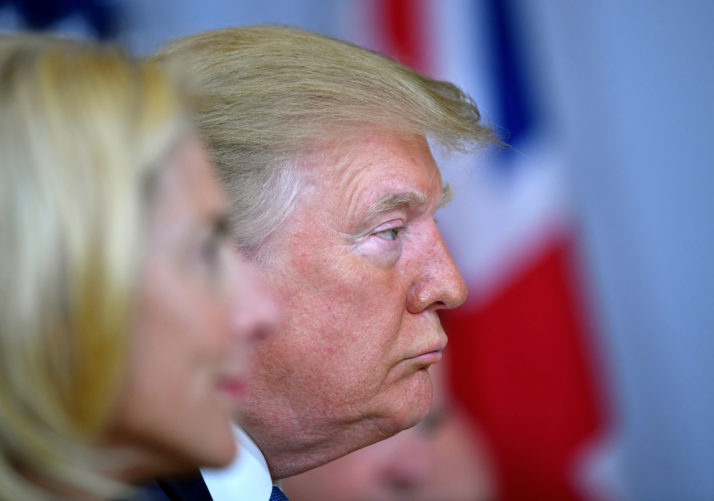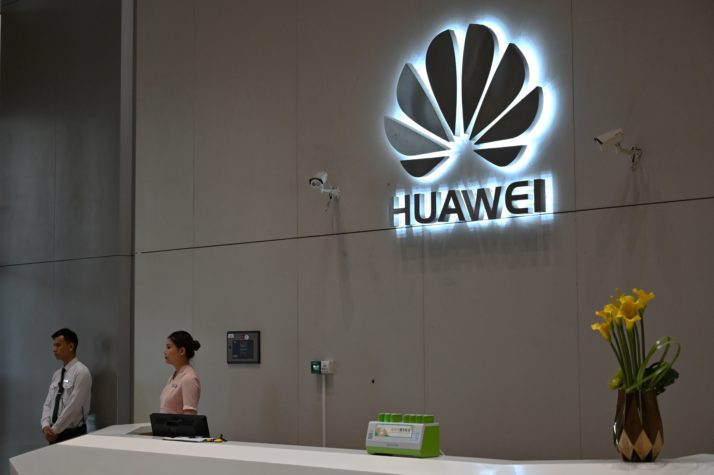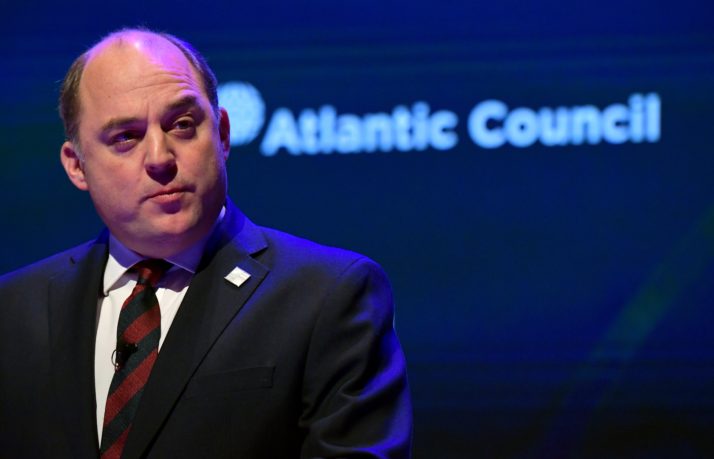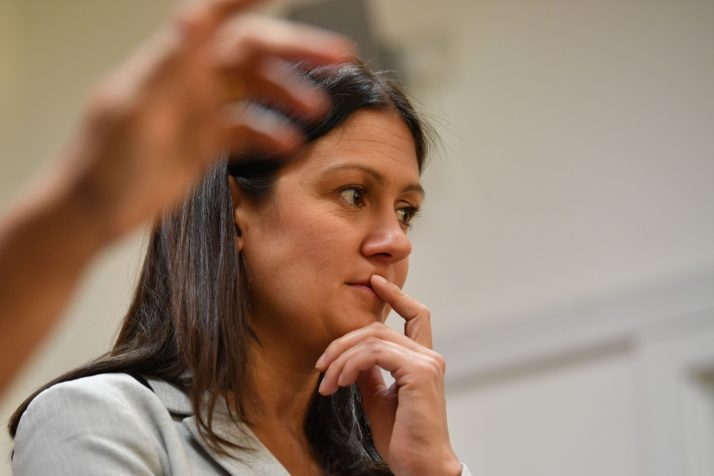This article is part of POLITICO’s Westminster Survival Guide.
LONDON — As Britain readies to leave the world’s largest trading bloc and step out onto the global battlefield, it faces one major problem: U.S. President Donald Trump has changed the rules of engagement.
Where previous U.S. leaders tended to keep talks about economic policy and national security separate — at least between allies — Trump is unapologetic about making one conditional on the other.
The commander in chief refuses to trade with those who do business with his enemies; threatens his friends with tariffs if they fail to sign up to his foreign policy objectives; and invokes arguably spurious security complaints to trigger trade wars with fellow Western states.
“It’s the bully-boy style,” said Barry Gardiner, the British Labour Party’s shadow international trade secretary. Trump, he said, is telling allies: “We can either be nice or we can be nasty to you. And if you want us to be nice, this is what you have got to give us.”
That puts U.K. Prime Minister Boris Johnson, who has placed the U.S. at the top of his trade deal wish list, in a difficult position as he tries to chart a new course for the country as an independent trading partner after Brexit.
At stake is not only Britain’s economic outlook, but its position on the global stage: Whom will London align itself with on hot-button issues like Iran and the use of Chinese-manufactured 5G technology — and at what cost?
Bully boy
Trade-offs on foreign policy are arguably a normal part of bilateral negotiations, including on trade. From British gunboat diplomacy off the coast of China in the 19th century to U.S. sanctions against Iran and Cuba in the 20th, countries often have brought out the big guns to defend commercial interests.
But, at least among allies, there was an effort to keep up appearances that the two issues were treated separately.
Trump’s approach since coming to office has entirely changed the rules, officials and experts say.
As tensions between Tehran and Washington escalated following Washington’s decision to leave the Iran nuclear deal in 2018, Trump took to Twitter to pile pressure on European countries: “Anyone doing business with Iran will NOT be doing business with the United States,” he wrote. Less than a year later he ended sanctions waivers for a handful of countries, including Japan and South Korea, because they continued to buy oil from Iran.

U.S. President Donald Trump’s philosophy on trade rules could prove a headache for the post-Brexit U.K. | Pool photo by Dylan Martinez/Getty Images
The overt pressure campaign took many by surprise. “I don’t recall a recent example of that in the post-Cold War period,” said Professor Malcolm Chalmers, the deputy director general of the Royal United Services Institute (RUSI).
It has since become a seemingly inescapable part of the U.S. president’s foreign policy strategy.
Earlier this month, Trump issued a fresh threat to slap tariffs on European cars if Germany, France and the U.K. refused to trigger a dispute resolution mechanism under the Iran nuclear accord. The British government insisted the decision to trigger the mechanism was taken independently of any threats — but did not deny Trump had made the gambit.
Meanwhile, Richard Goldberg, a Trump ally and former White House aide, took to the airwaves in Britain to warn Johnson that refusing to back the U.S. president on Iran could scupper his hopes of striking a transatlantic free-trade deal after Brexit.
“It’s absolutely in [Johnson’s] interests and the people of Great Britain’s interests to join with President Trump, with the United States, to realign your foreign policy away from Brussels, and to join the maximum pressure campaign to keep all of us safe,” Goldberg, an ex-member of the White House National Security Council, told the BBC.
“There is a great clarity now that you can choose who you trade with at your peril,” said a British defense industry boss. “I’m sure it’s always been there as an undercurrent, but I think it is simply becoming more and more overt.”
Besides using trade as a battering ram to push his national security objectives, Trump has also invoked national security concerns to pursue his trade objectives.
“Steel is steel. You don’t have steel, you don’t have a country” — Donald Trump, U.S. president
The president had long railed against what he called trading imbalances with some of the U.S.’s largest trading partners. But when he announced double-digit tariffs on steel and aluminum imports in 2018, hitting trading partners around the world including Canada, Mexico and the EU, he cited national security as the main motivation.
“A strong steel and aluminum industry are vital to our national security, absolutely vital,” Trump said at a White House announcement event, flanked by metal workers holding hard hats. “Steel is steel. You don’t have steel, you don’t have a country.”
Trump was not the first to use the national security clause in World Trade Organization rules to breach obligations to the global body. Russia did so in a case against Ukraine, while Qatar and United Arab Emirates also ended up locked in a national security dispute. But both cases were born out of direct conflict of some kind — the war in Ukraine and support for extremism in the Middle East respectively.
The Trump tariffs invoked the national security loophole in a purely business case — a move that was tenuous at best.

Trump has also played the national security card in his battle against Chinese telecoms giant Huawei | Hector Retamal/AFP via Getty Images
Trump sought to “broaden the definition beyond being in any way useful for its original purpose,” said David Tinline, a former adviser to WTO Director General Roberto Azevêdo.
The move raised fears, he said, that blatant exploitation of the clause “could be a nuclear-button move for the trading system” and “remove a vital safeguard in international relations that prevents economic disputes escalating into potentially much bigger problems.”
Trump has also pulled out the national security card in his battle against Huawei, piling pressure on countries not to allow the Chinese firm to build 5G infrastructure networks. Australia, New Zealand and Japan have imposed outright bans, while Britain, France and Germany have agreed to some level of regulation but so far resisted excluding the Chinese company outright.
Johnson has suggested he might roll back some of the restrictions imposed by his predecessor — a move that has sparked a frenzy of lobbying from the White House and a warning that Washington could scale back its intelligence-sharing with Britain if it allows access to Huawei.
High stakes
Trump’s willingness to make a trade agreement conditional on security and foreign policy demands puts the U.K. in a particularly vulnerable position.
For Johnson, who has peddled visions of a powerful Global Britain free to strike trade deals with partners across the world, the stakes of a potential fallout with Washington are high.
A trade deal with the U.S. is widely seen as the first test of the U.K.’s power outside the EU — and of Johnson’s ability to deliver on his promises there will be tangible benefits to the U.K.’s decision to leave the world’s most powerful trading bloc and strike out on its own.
“The trouble here is that because of the domestic political situation, there will be a propensity for Prime Minister Johnson to want to show that he has achieved a deal and that it can open up certain new opportunities for the U.K.,” said Gardiner, the shadow international trade secretary. “And he may well pay a very heavy price that is exacted by the U.S. in return for that.”
“Trump is someone who will use every bargaining chip possible, including foreign policy [and] security policy,” he added. The U.K., he warned, has to be “careful” in its negotiations with Washington.
“What Donald Trump wants to see is the end of the EU and the vassalization of any part of it into his orbit” — Angus MacNeil, SNP MP
Angus MacNeil, an anti-Brexit former chair of the international trade committee in the U.K. House of Commons, said Trump will have Britain exactly where he wants it in trade talks.
“What Donald Trump wants to see is the end of the EU and the vassalization of any part of it into his orbit,” the Scottish National Party MP said. “Inevitably the U.K. will not have any big sticks to take on something that’s 10 times its size, so he can pick the U.K. off very easily.”
For Johnson, the question will be what he is willing to sell off for the short-term political gain of being able to boast that he clinched a deal with Washington.
“The U.K. will have to decide whether or not major bits of its foreign policy and domestic policy gets dictated by the U.S.,” said a ministry of defense official. “Some observers would probably point out that it already is to a fair degree.”
“The U.S. will be the most forward in terms of saying ‘if you want that to happen, you have to do this,’” he added.
The military question
Britain’s exit from the EU will also make it the weaker party in the so-called special relationship with Washington when it comes to long-standing military cooperation.
A recent analysis by the ministry of defense found U.S. investment in the U.K. armed forces was worth around £4 billion a year, amounting to nearly 10 percent of the U.K. military budget, the official said.
The money goes to things like the use of U.S. bases around the world, training programs, joint deployments and U.S. investment in British military funding. The U.S. also leases the missiles on the Trident nuclear weapon to the U.K. and runs their servicing and testing — giving Washington a crucial hold over Britain’s ultimate deterrent.
Trump is likely to milk this for all it’s worth in any trade negotiations, experts say.
“It will be bloody tough,” said the defense official. “If you’re looking at basically taking away parts of a £4-billion benefit to U.K. defense at home and overseas, then you could have big problems ahead.”
The U.K. should prepare to fight wars without its closest ally, U.K. Defense Secretary Ben Wallace said earlier this month, amid fears Trump could continue to pursue an even more isolationist foreign policy.

Ben Wallace, the U.K. defense secretary | Tobias Schwarz/AFP via Getty Images
“We are very dependent on American air cover and American intelligence, surveillance and reconnaissance assets,” he told the Times. “We need to diversify our assets.”
“I think it’s a real concern that President Trump, with his deal-making approach to international affairs in relation to allies, creates a very strong impression — he states directly, in many cases — that he needs something in return for providing security guarantees,” said Chalmers, the RUSI deputy director.
Last month, Trump refused to commit to defending any NATO ally that fails to spend 2 percent of its GDP on defense and suggested he could raise tariffs to incentivize action.
“That’s a really profound worry,” Chalmers added, “because it means that at any moment the security framework, which allies thought they could rely on, becomes subject to economic conditionality, which can change from month to month.”
Others are more optimistic that shared security concerns — which they say go beyond immediate foreign policy goals — will hold the partnership together and protect a trade deal from falling apart over different approaches to foreign policy.
“Our security relationship with the U.S. is dependent upon the sharing of intelligence, the gathering of intelligence, as well as the sharing of capabilities, not least in nuclear technology. It’s not easy to disaggregate,” said former International Trade Secretary Liam Fox.
Decision time
How Johnson can best navigate the new transactional relationship with the U.S. remains an open question.
Will he contract out part of his foreign policy to the U.S. president in return for the prize trade deal? Or can he match Trump in his aggression and play the bully to get what he wants from other nations — particularly smaller economies around the globe?
Labour Party leadership hopeful Lisa Nandy has argued that Britain should be bullish with other nations around the world on climate — arguably the ultimate national security issue — as it shapes its future trade policy.
“As we look to forge new trading alliances across the world, we will need to make choices,” she told an audience in London last week. “We should be clear now: We will refuse to agree any trade deal with a country that has not ratified the Paris Agreement.”
Her comment was a clear swipe at Trump, who began the formal process to quit the climate deal in November 2019.
But taking a page out of Trump’s own playbook can backfire, as former Prime Minister Theresa May found out the hard way, when she threatened the EU with a more limited security partnership if the bloc refused to play ball on trade. Amid fierce blowback, she was forced to row back on her comments and confirm the U.K. was “unconditionally committed to maintaining Europe’s security.”

Lisa Nandy, Labour Party leadership candidate, swiped at Trump last week | Ben Stansall/AFP via Getty Images
Others argue that once the U.K. has left the EU, it simply will not have the power to try to push around economies that are bigger than itself — and shouldn’t bother trying.
“If you want a trade deal with America you are going to have to sign up on American terms,” said MacNeil, the trade committee chair.
“Quite frankly if we say ‘no,’ the U.S. is not going to take any notice,” said Chris Southworth, the secretary-general of the U.K. International Chambers of Commerce. “You’re better off being friendly … If we’re coming across as bullies that’s not going to reflect well on us longer term.”
There’s also a third possible approach to post-Brexit diplomacy, according to Southworth: The U.K. could play mediator, using its new trading role to bring sparring nations, such as the U.S. and Iran, together, and help fix global issues like climate change.
“The traditional role of the U.K. would be the broker,” said Southworth. “That’s what we need to see — the U.K. really stepping up now to its global leadership role and acting as a facilitator to find solutions to these issues, rather than trying to jump into one camp or the other.”
The U.K. will struggle to retain the same power and influence without its voice being amplified through the EU, he predicted. But by working on tangible solutions to problems like climate change and digitization, it can play “an important” role alongside other second-tier nations like Canada, Singapore, Brazil, Australia and New Zealand.
“In the end, both the U.S. and the EU need the U.K. just as we need them” — Professor Malcolm Chalmers, deputy director general of the Royal United Services Institute
“They are very effective bridges, and they play an incredibly important role getting deals done because they are brokering the dialogue between the big players and the less-developed countries,” he explained.
“You have to get agreement from the less-developed countries to get any agreement at global level, so that’s just as important as getting agreement across the big players.”
It’s a strategy that would allow the U.K. to slip out from potential pressure from the EU, too, said Chalmers, from RUSI.
Both Washington and Brussels will want to sign the U.K. up to their approaches on military interventions, sanctions and technological infrastructure. But London won’t necessarily have to side with one or the other on everything at once.
“In the end, both the U.S. and the EU need the U.K. just as we need them,” he said. “I don’t think the U.K. has to make a strategic choice of being wholly dependent on the U.S. or the EU for its whole foreign policy.”
With Brexit, Britain is tossing itself out to sea during a major storm. Its first order of business as it navigates the new landscape, and the new rules of the power game between big nations, will be to dodge the Trump gunboats.
Source: politico.com
See more here: news365.stream






